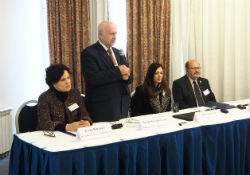Training on cancer registration methods and strengthening registries held in Moscow

WHO/O. Manukhinao
More than 60 experts, analysts, epidemiologists and medical statisticians working in cancer registration, as well as other cancer registry professionals from 29 Russian regions and national institutions got together in Moscow to attend a 4-day training course on cancer registration methods and strengthening cancer registries on 26–29 September 2017.
The training course was aimed at building the participants’ professional capacity to establish and sustainably maintain high-quality population-based cancer registries providing internationally comparable data. The collection of data on cancer patients is mandatory in the Russian Federation and all the regional registries submit data to coordinating institutions in Moscow, in particular the National Medical Radiology Research Center, which publish national data annually. Nevertheless, the system is not uniform and data quality levels vary greatly across the Russian regions. Thus, upon completion of the course, the participants gained skills to manage cancer registries and analyse the information they generate for overall improvement of health and the health system in the country.
The training course was organized jointly by WHO/Europe, through its Country Office in the Russian Federation and the European Office for Prevention and Control of Noncommunicable Diseases, the International Agency for Research on Cancer (IARC) and the National Medical Radiology Research Center. Its curriculum had a major focus on the international principles, standards and methods of population-based cancer registration; basic statistical standardization procedures for comparisons; and primary functions and requirements for cancer registration software, including the IARC and national online databases. A pool of international and national facilitators highlighted diverse practical implications stemming from the population-based cancer registries. Participants from the regions shared information on their registries, and the last day was devoted to the specific issues relevant to the Russian Federation, providing an invaluable basis for dialogue between the Russian Federation and international experts.
This course was the third in a series of training courses started in 2015. It served additionally as a platform for professional networking within the Russian Federation and with IARC, the Global Initiative on Cancer Registries (GICR) and the European Network of Cancer Registries (ENCR), providing the opportunity for the participants to discuss barriers and solutions to collection of data, and exchange opinions on ways to improve cancer registration in their regions. The overall impression of the training course can be summarized in the words of Lilia Zhuykova, a participant from Tomsk: “I am very glad to be here. I have been working in this sphere for more than 20 years and this is the first time I have attended such a purely epidemiological event. If you work in a specific area and you are good at it, you have a definite approach to a problem, I mean tunnel vision. Having joined this training, first of all, I have seen concepts and approaches from the other side. Secondly, I have compared our knowledge with the international background, not by reading but through interpretations, comments and recommendations of our foreign colleagues. And finally, I have become aware of the development level of the population-based registries in different Russian regions”.
No country can do without high-quality population-based cancer registries, which provide the evidence base for cancer diagnosis, prevention and control activities, by quantifying the burden of this life-threatening disease.
In the Russian Federation, which has a long tradition of cancer control and registration, there is still a need to continuously educate and update new generations of cancer registry professionals, who will employ the acquired skills to establish and maintain high-quality regional cancer registries that will contribute to more accurate national estimates.



